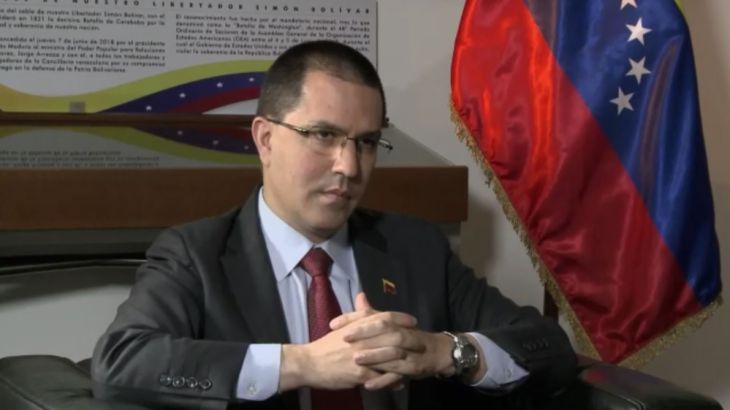
Venezuela’s Jorge Arreaza: ‘There is no perfect government’
The Venezuelan foreign minister discusses the country’s ongoing crisis and threats of international intervention.
On January 10, 2019, Venezuela‘s President Nicolas Maduro was sworn in for a second term following elections that were not recognised as legitimate by his opponents and much of the international community.
This set in motion a plan by the opposition to declare Juan Guaido, the president of the National Assembly, Venezuela’s interim president. More than 50 countries recognised him and called on Maduro to step aside to allow new elections.
Keep reading
list of 4 itemsVenezuela opposition figure Guaido in Colombia ahead of summit
Venezuelan court issues warrants for new opposition leaders
Venezuelan government, opposition to resume political talks
Months later, the political unrest in the country continues.
Foreign Minister Jorge Arreaza, trying to convince the world that Venezuela is a victim of US aggression, has been visiting countries around the world to seek their political and economic support.
“Right now $5bn are blocked, and the Americans say that ‘Maduro is going to steal them, the drug-dealing evil dictator Maduro is going to steal them’,” Arreaza told Al Jazeera.
“No, that’s money for vaccines, for seeds, for agriculture, that’s money for healthcare, infrastructure, for production in Venezuela, to pay for our international commitments. That’s what those resources are for, they belong to the Venezuelan people.”
Venezuela is the geopolitical epicentre of a flagrant violation of international law, and if the international community allows this to happen in Venezuela it will happen anywhere else
Since Maduro took office in 2013, Venezuela’s economy has plummeted – as has oil production, the country’s lifeline. While Maduro blames domestic and foreign opponents for widespread shortages of food, medicine, water and electricity, more and more Venezuelans believe their once-rich nation’s collapse is has been caused by gross government incompetence and corruption.
“There is no perfect government,” Arreaza said. “All governments make mistakes and have merits. Our government is not perfect, it’s run by humans.” He admits that: “In economic matters, there could have been decisions made differently,” but argues that options are limited because of Venezuela’s “battered economy” that is “blocked in every way possible”.
The United States has already imposed sanctions on a number of Venezuelan economic sectors, part of a series of economic measures to cut oil revenues to Maduro in an effort to help push him from power.
Opinion polls show Guaido has wide public support, but the government has proved far more resilient than predicted. Russia and China, which have large investments in Venezuela, have supported Maduro. He also maintains the crucial support of the military high command.
When Guaido unsuccessfully attempted to encourage a military uprising on April 30, the crisis entered a new, critical phase. While some opposition deputies were arrested, others went underground. Guaido, who many see as untouchable due to his high-profile status and US backing, has remained free.
Meanwhile calls for US military intervention are rising.
“If the US goes after Venezuela today, it will do it to Cuba tomorrow or Nicaragua the day after,” Arreaza said.
“Venezuela is the geopolitical epicentre of a flagrant violation of international law, and if the international community allows this to happen in Venezuela it will happen anywhere else. There will be no stopping the imperial madness.”
It’s been four months since Venezuela’s political uprising began. Last week, surprisingly, the two sides agreed to send envoys to Oslo to explore a possible negotiated way out of a crisis. But the next steps remain to be seen.
“Both parties have to concede, there is no negotiation without concessions,” Arreaza says.